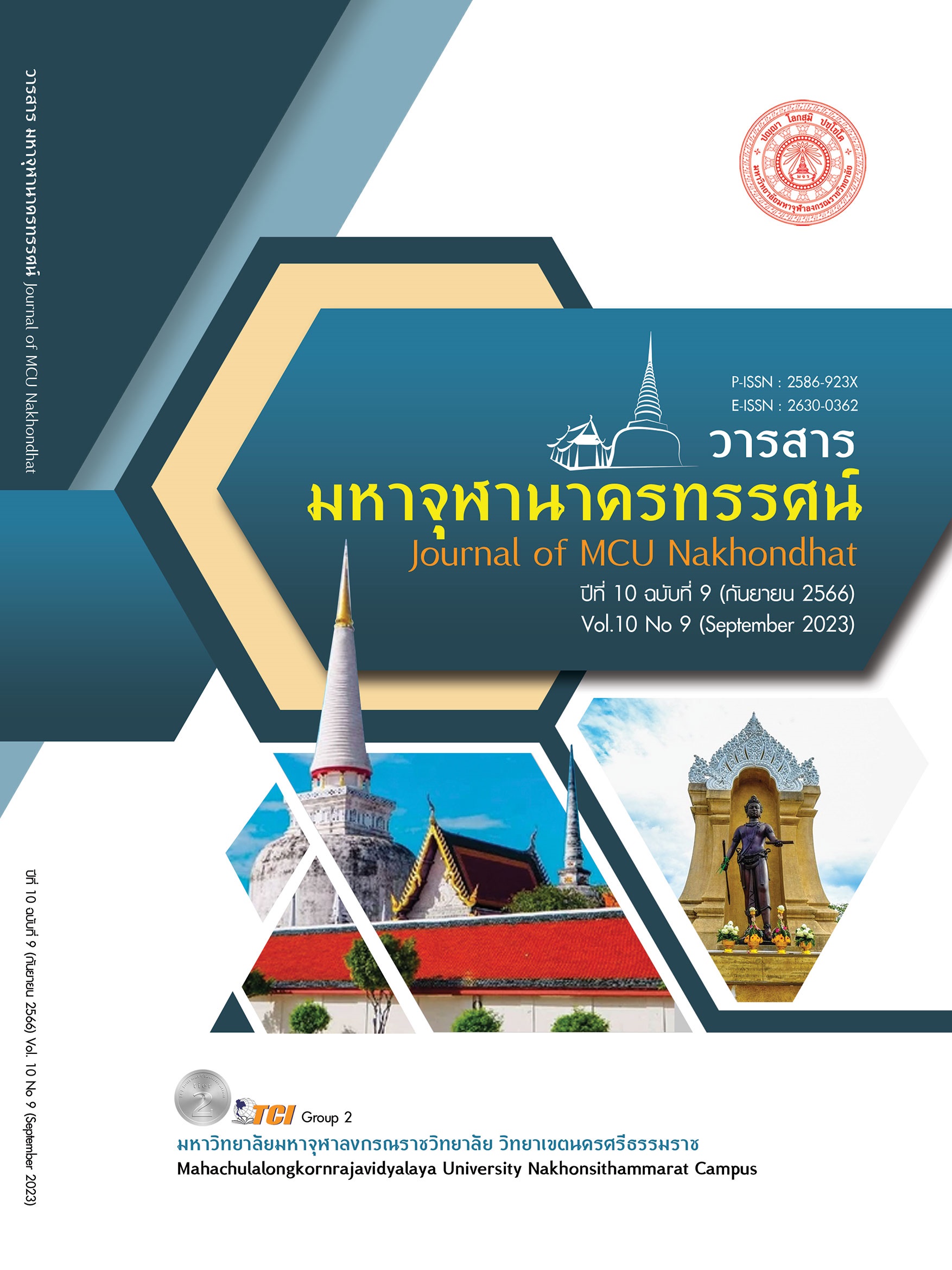THE INFLUENCE OF PSYCHOLOGICAL CAPITAL, ORGANIZATIONAL SUPPORT, AND TRUST IN SUPERVISOR ON WORK ENGAGEMENT OF BRANCH GAS STATION MANAGERS IN A PETROLEUM COMPANY
Main Article Content
Abstract
The objectives of this research were to: 1) study the level of psychological capital, organizational support, trust in supervisor, and work engagement of branch gas station managers in a petroleum company; and 2) study the influence of psychological capital, organizational support, and trust in supervisor on work engagement of branch gas station managers in a petroleum company. This was quantitative research. The population comprised 1,100 gas station managers of petroleum companies, while the sample group consisted of 285 branch gas station managers selected through stratified random sampling. The research tools consisted of a personal data form, psychological capital questionnaire, organizational support questionnaire, trust in supervisor questionnaire, and work engagement questionnaire. Statistical methods were percentage, mean, standard deviation, correlation coefficient analysis, and multiple regression analysis with a stepwise method. The results indicated that: 1) branch gas station managers in a petroleum company had an overall psychological capital at a high level, in part of self - efficacy, optimism, hope, and resilience were at high levels; branch gas station managers in a petroleum company had organizational support and trust in supervisors at fairly high levels; branch gas station managers in a petroleum company had work engagement at a high level. 2) psychological capital in part of self - efficacy, optimism, resilience, and organizational support could jointly predict 62.8 % of work engagement of branch gas station managers in a petroleum company at .01 level of statistical significance.
Article Details

This work is licensed under a Creative Commons Attribution-NonCommercial-NoDerivatives 4.0 International License.
References
ประชาชาติธุรกิจ. (2562). ปั๊มน้ำมันแข่งเดือดเอสโซ่งัดบัตรสไมล์ชิงลูกค้า. เรียกใช้เมื่อ 25 มิถุนายน 2562 จาก https://www.prachachat.net/economy/news - 342348
ปราชญา กล้าผจัญ และพอตา บุตรสุทธิวงศ์. (2550). การบริหารทรัพยากรมนุษย์. กรุงเทพมหานคร: ก. พลการพิมพ์.
เปรมจิตร์ คล้ายเพ็ชร์. (2548). การรับรู้การสนับสนุนจากองค์การ ความยุติธรรมองค์การที่มีผลต่อความผูกพันองค์การ และความตั้งใจลาออก. ใน วิทยานิพนธ์ศิลปะศาสตรมหาบัณฑิต. สาขาจิตวิทยาอุตสาหกรรมและองค์การ. มหาวิทยาลัยธรรมศาสตร์.
ฝ่ายบริหารทรัพยากรบุคคลบริษัทปิโตรเลียมแห่งหนึ่ง. (2562). ข้อมูลองค์การ. เรียกใช้เมื่อ 1 มิถุนายน 2562 จาก http://investor.ptgenergy.co.th/th
พัชราภรณ์ ศรีสวัสดิ์. (2555). ต้นทุนทางจิตวิทยา. พัฒนาเทคนิคศึกษา, 25(84), 34 - 39.
สัญชาติ พรมดง. (2561). ทุนทางจิตวิทยาด้านบวกที่มีผลต่อประสิทธิภาพการปฏิบัติงานของพนักงาน: กรณีศึกษา บริษัท โฮม โปรดักส์ เซ็นเตอร์ จำกัด (มหาชน). ใน การค้นคว้าอิสระปริญญาบริหารธุรกิจมหาบัณฑิต สาขาบริหารธุรกิจ. มหาวิทยาลัยเทคโนโลยีราชมงคลธัญบุรี.
อานนท์ เสียงพานิช. (2559). มาตรการลดการลาออกของพนักงาน บริษัทผลิตเป็ดเอกชนแห่งหนึ่ง ในจังหวัดฉะเชิงเทรา. ใน วิทยานิพนธ์รัฐประศาสนศาสตรมหาบัณฑิต สาขาการบริหารทั่วไป. มหาวิทยาลัยบูรพา.
Avey et al. (2011). Meta-analysis of the impact of positive psychological capital on employee attitudes, behaviors, and performance. Human resource development quarterly, 22(2), 127 - 152.
Bakker & Leiter. (2010). Work Engagement: A Handbook of Essential Theory and Research. New York: Psychology Press.
Bakker, A. B. et al. (2011). Key questions regarding work engagement. European Journal of Work and Organizational Psychology, 20(1), 4 - 28.
Diener et al. (2002). Subjective well-being: The science of happiness and life satisfaction. London: Oxford University Press, 463 - 743.
Eisenberger et al. (1986). Perceived organizational support. Journal of Applied Psychology, 71(3), 500-507.
Krejcie, R.V., & D.W. Morgan. (1970). “Determining Sample Size for Research Activities”. Educational and Psychological Measurement, 30(3), 607 - 610.
Luthans et al. (2007). Psychological Capital:Developing the Human Competitive Edge. New York: Oxford University Press.
Mishra, A. K. (1996). Organizational responses to crisis: The centrality of trust. New Delhi: Thousand Oaks.
Seligman, M. E. (1988). Learned Optimism. New York: Pocketbooks.
Sweetman, D., & Luthans, F. (2010). The power of positive psychology: Psychological Capital and work engagement. NewYork: Psychology Press.


